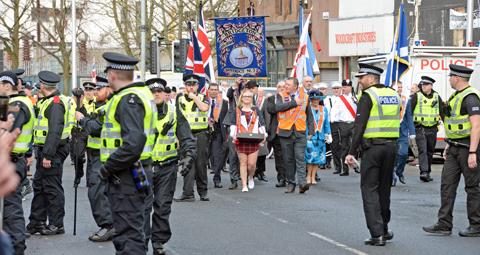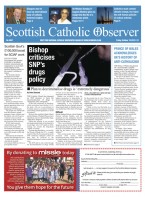BY No Author | July 26 2019 | ![]() 0 COMMENTS
0 COMMENTS ![]() print
print

Revealed: over 2,000 Orange walks in Scotland over the last three years
Publication Date: 2019-07-26
First review of national figures in 16 years finds a drop in number of marches in Scotland — by Ryan McDougall, Daniel Harkins and Peter Diamond
There have been at least 2,079 Orange marches in Scotland in the last three years, with a decline year on year since 2017, research by the SCO has revealed.
The SCO asked every local authority in Scotland for a list of processions from 2017 to compile the largest database of the historically anti-Catholic marches since Sir John Orr’s 2005 review of marches and parades.
That review found that there were 853 Orange parades in Scotland in 2003. By contrast, in 2017 there were 834 marches, 747 in 2018 and 498 so far this year.
Further reduction
Though many councils submitted 2019 figures before the marching season, a comparison of figures from previous years with marches held so far this year suggests there will be a further reduction in 2019.
Only two local authorities recorded a significant increase in Orange marches since Sir John’s 2005 review: Falkirk, which had 20 marches in 2003 but averaged 50 marches a year since 2017, and North Lanarkshire, with marches spiking in 2017 but decreasing to 169 this year, in comparison to 157 in 2003.
For the purposes of this research, the SCO has defined ‘Orange marches’ as those by the Orange Order and associated groups such as the Apprentice Boys of Derry and the Royal Black Institute, the same criteria used in the Sir John Orr review.
Fife
The statistics exclude Fife Council, which failed to reveal their figures, despite being legally bound to hold and make available a list of processions.
Last year DUP leader Arlene Foster attended an Orange march in the local authority area at which police officers were given briefings suggesting that waving the Vatican flag ‘provocatively’ could be a criminal act.
Responding to the figures, the Catholic Church in Scotland highlighted that ‘the number of parades is less important than the manner in which they are conducted.’
Glasgow
Glasgow, North Lanarkshire, West Lothian and South Lanarkshire were the areas with the most Orange marches.
Glasgow had 256 marches in 2017, 208 in 2018 and 59 as of June 3 2019. That figure will increase significantly by the end of the year, but is predicted to be similar to 2018’s figure.
The figures are higher than the council’s own estimates, as the local authority records some Orange walks under the headings of ‘bands’ and ‘other.’
Negotiation
John Mason, SNP MSP for Glasgow and Shettleston, said: “Any reduction in the number of marches is welcome. I agree that in a democracy people have the right to march or demonstrate even if we do not like what they are supporting.
“However, it is the sheer number of these marches on a very similar theme that I think many people have questions about.
“Concerning actual routes of marches, there needs to be negotiation and compromise on both sides. The marchers cannot insist on exact routes and the opponents cannot veto any route.”
He added that groups including Catholics, Jews, Muslims and others are treated ‘unfairly’ in society.
“What saddens me most about all of this is that I consider Catholics, Protestants, Baptists, etc. to all be part of the Christian faith.
“We agree on 90 per cent of our beliefs including for example, the virgin birth, Jesus’ death on the Cross for our sins, His Resurrection, and His coming again.
“Right now I am attending a Christian event with the theme of unity. So we really need to emphasise more when we are agreed on rather than the traditional focus on what divides us.”
Call for discussion
Paul Sweeney, Labour MP for Glasgow North East, said he hopes ‘formal discussions can take place between Glasgow Archdiocese, Glasgow City Council, Police Scotland and the Loyal Orders in order to reach an accord to resolve this situation’ and that he would give his support.
In July last year, Canon Tom White was attacked outside St Alphonsus’ Church in Glasgow as an Orange walk marched past his church. A subsequent march earlier this year was marred with anti-Catholic abuse.
Reacting to the new stats, one parishioner of the church, who wished to remain anonymous, said: “I have been a member of the parish for 45 years and you can guarantee that during the summer months there is a march every other weekend. It does affect your life and has an impact on the overall Catholic community.”
GCC response
A spokesperson for Glasgow City Council said: “The law allows any organiser to notify a council of its intention to carry out a procession at 28 days’ notice, so it will never be possible to predict the number of marches halfway through a year. However, as things stand, there is nothing to suggest we should expect any spike in 2019.
“The council is mindful of the potential impact of public processions on the wider community and will continue to examine how the rights of the community are best supported.”
North Lanarkshire
North Lanarkshire Council had 212 Orange marches in 2017, 198 in 2018 and 169 as of July 12 this year, with 25 more scheduled to take place.
Catholic SNP MSP Clare Adamson, who represents the Motherwell and Wishaw constituency within North Lanarkshire, said: “My underlying concern is that Orange marches have an inextricable link to the rejection of another belief.
“This can foster prejudicial sentiment and it is inevitable that holding the marches will stoke tensions along the sectarian divide.
“Additionally, we have seen an increasing accompanying antisocial element to these marches—with some unacceptable and criminal behaviour taking place.
“There can be no room for these incidences. We must work harder to be kind to one another and denounce prejudice in all its ugly forms.”
A spokesperson for North Lanarkshire Council commented: “The council does not condone violence or disorder. It considers any objections or risks to planned processions in relation to public safety, public order, and damage to property and disruption to community life.”
Further processions
In West Lothian, there were 79 Orange marches in 2017, 78 in 2018 and 60 as of July 9, 2019, with 12 others currently scheduled to take place.
South Lanarkshire had 80 in 2017, 73 in 2018 and 57 as of July 12, with four scheduled to take place.
In Falkirk, there were 57 marches in 2017, 49 in 2018, and 38 as of July 6, with five more scheduled.
For the three years since 2017, total figures for other council areas include: North Ayrshire (115), Renfrewshire (70), East Ayrshire (59), Stirling (26), Inverclyde (27), East Dunbartonshire (17), South Ayrshire (17), East Renfrewshire (15), and East Lothian (14).
Clackmannanshire, Edinburgh City, the Highlands, Midlothian, Perth, West Dunbartonshire, Aberdeenshire, Angus and Dumfries and Galloway had less than 10 marches since 2017.
According to the data provided, Aberdeen City, Argyll, Dundee City, Moray, Orkney, Borders, Shetlands, and Comhairle nan Eilean Siar have had no Orange marches since 2017.
Church response
A spokesman for the Catholic Church in Scotland said police and local authorities should ensure safety and public order when considering parade applications, adding: “The number of parades is less important than the manner in which they are conducted.
“The Church expects that the routing and timing of marches should not cause difficulties or anxiety for parishioners.”
Call it Out, a group which formed after the attack on Canon White and have campaigned against Orange walks past Catholic churches, said the figures show the excessive and disproportionate number of anti-Catholic marches in Scotland.
“Each one is a source of distress to Catholics but those that are deliberately routed to pass Catholic Churches are completely unacceptable,” Jeanette Findlay from the group said.
“Moreover we have the annual ‘hatefest’ in Glasgow where multiple marches are coordinated in such a way as to take over the whole city for an entire day with egregious displays of hatred, widespread drunkenness and routine petty criminality. Citizens, businesses and tourists are all negatively affected and this absolutely has to stop.
“Local authorities have the power to limit and reroute these marches and we argue that doing so would be a proportionate and reasonable action to achieve a lawful aim.”
Right to assembly
A Scottish Government spokesperson said: “While there is a right to public assembly, that must always be balanced with the rights of communities to go about their business without fear for their safety.
“We fully support local authorities to use the powers available to them to place any necessary conditions on marches and parades, as well as supporting Police Scotland to maintain public order and take appropriate action to tackle any incidents of violence or disorder that occur.”
In Northern Ireland the number of processions is monitored by the Parades Commission. In 2018 the number of Protestant, Unionist and Loyalist parades in Ireland was 2,435, a reduction on the previous year which was 2,595.










